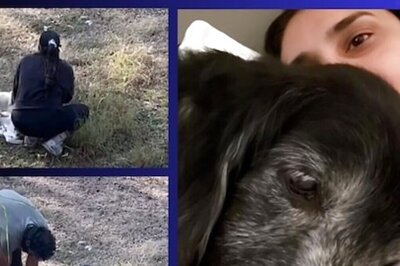
views
How to Enable Pet Battles

Reach level 5 and get training from a Battle Pet Trainer. Upon leveling your character up to level 5, you can seek out a Battle Pet Trainer in either Stormwind or Orgrimmar (depending on whether you’re with the Alliance or the Horde). Either trainer can give you Battle Pet Training for a free of 10 gold and show you how to track pets on the minimap. If you’re in the Alliance, find Audrey Burnhep in Stormwind. If you’re in the Horde, seek out Varzok in Orgrimmar. Once you learn how to do pet battles with one character, all other characters will also get the training.
Battle Pet Trainers can also teach you a race-specific pet. If you don’t already have the designated pet for your character’s race in your collection, the Battle Pet Trainer will offer to teach you how to train that specific pet. However, you can still add all of the below pets to your collection, either by visiting your faction’s auction house or simply creating characters of each race. Starter pets include: Draenei: Blue moth Dwarf or gnome: Snowshoe rabbit Human: Orange tabby cat Night elf: Great horned owl Worgen: Gilnean raven Blood elf: Golden dragonhawk hatchling Goblin: Shore crawler Orc or troll: Black kingsnake Tauren: Brown prairie dog Undead: Undercity cockroach Pandaren: Jade crane chick
How to Get Pets
You can capture, loot, craft, or buy pets in WoW. The primary way to get new pets is to find wild ones and capture them (as detailed below). However, you can also loot them from bosses and raid dungeons, craft them from most of the crafting professions, earn them in holiday events, or buy them from the Auction House (or with real money from WoW’s cash shop). If you buy pets from the auction house or trade with other players, remember you can only add it to your collection if its level is equal to or less than your highest-level pet! Pets looted from raid dungeons and bosses always start at level 1. Crafted pets are often classified as “Bind-on-Equip,” meaning you can buy them from other players without needing to craft them yourself. Some pets are also available as quest rewards, though they tend to be “Bind-on-Pickup,” meaning you can’t buy or trade them.
Pet Battle Basics
Select pets from your Pet Journal and add them to your roster. When you undergo Pet Battle training, you’ll also unlock the first slot in your Pet Battle team. Add an active pet to your team by selecting it from the list in your Pet Journal and dragging it into the empty space under your Battle Pet slots. You can find your Pet Journal in a tab to the right of your Mount Journal. Once you’ve done that, speak with your trainer one more time to get a quest chain that’ll teach you the Revive Battle Pet spell. You’ll need it later! You can have 3 pets on your team total, though you’ll have to unlock the other 2 by completing the Newbie and Just a Pup achievements.
Track wild pets on your mini-map and right click on them to battle. Go to your mini-map and toggle the “Track Pets” ability on; this will cause a green paw print to appear on the map if a wild pet is nearby. You’ll also see that paw icon appear above a creature in the game if it’s available to battle and catch. To start a battle, right-click on the wild pet and it’ll take you into the Pet Battle UI to begin combat. However, you can’t start a Pet Battle if you’re already in combat—so make sure there are no enemies nearby!
Choose special abilities for your pets to use in battle. All pets have a total of 6 abilities to choose from, and you can select 3 of them to use in battle. They also have 3 active spell slots that show which abilities you can use in combat. The first spell slot is automatically unlocked, but the second and third will unlock only once your pet reaches a certain level (along with other spells). Each slot comes with 2 spell options. You can switch out the spell in a slot before or after a pet battle by clicking on the slot in your Pet Journal and selecting a new ability from the drop down menu. Some abilities that buff your pets (or debuff opponents) last through multiple rounds. Try using them first to get the most out of them in a battle. Hover over an ability with your mouse to see if that attack is weak or strong against certain types of pets. You can also hover over an opposing pet to view their attacks (and get a sense of their strengths or weaknesses).
Use the combat UI to track health and abilities during battles. You can view your active pet’s abilities, health, stats, and quality along with your opponent’s values. The gold border and “speed” icon around a pet’s portrait show its initiative (whether it’ll be first to act in a round). Additionally, the UI offers options to switch out pets, pass a turn, capture a pet, or forfeit the entire match. Remember that your pet’s speed determines initiative—so if your pet’s speed stat is higher than their opponent’s, you’ll get to act first.
Throw a trap on wild pets to capture them. Most wild PVE pets can be captured so long as you bring their health below 35% and then use the Trap ability when it lights up. However, keep in mind that using a Trap will take up your turn for the round, and you can only catch one pet in a team of wild pets—so choose the one you want before using a Trap. You can’t capture a pet if it dies in battle, so do your best to drop it below 35% health without killing it. To be safe, avoid using strong attacks when a wild pet drops below 50% health. Although most wild pets are catchable, not all are—so check your Pet Journal if you aren’t sure. If a pet isn’t listed, it probably can’t be caught. There’s a chance your Trap can fail, but that chance decreases with each additional attempt—so keep trying if it doesn’t work! Higher-level pets will also get weaker after being captured. Level 16 to 20 wild pets lose 1 level after being caught, and level 21 to 25 wild pets lose 2 levels.
How do pet battles work?
There are 4 main types of pet battle. Those 4 types are: wild pet battles, battles against NPC tamers, queuing for a PVP battle, or challenging a player to a PVP duel. Each type of battle is slightly different, though the core mechanics remain generally the same. Wild pet battles are PVE (player versus environment). They involve tracking down a wild pet and either battling it to the death or capturing it. Pet tamers are NPCs (non player characters) with pets of their own, and though battles work similarly to wild pet battles, you can’t capture an NPC opponent’s pets. Queued pet battles involve pitting your pets against a randomly-selected opponent, and they award experience points. Duels involve directly challenging a nearby character. Although they work like queued pet battles, they don’t award experience.
Combat is turn-based with no time limits in PVE Pet Battles. That means you can take the time you need to figure out what abilities to use. Keep in mind that some abilities have cooldown times that last multiple rounds and others can do damage if you meet certain conditions—so don’t be afraid to explore which attacks work best against different opponents. High-level wild pets often have a team of multiple other wild pets backing them up in a fight, and you won’t be able to see accompanying pets until you begin a battle. In battles with multiple opponents, you’ll need to defeat or capture all opposing battle pets; not just the one you initially targeted. That means if you trap a wild pet but lose the match to another pet on the team, you’ll lose the captured pet too.
You can switch out your current pet during battle. If your pet starts getting too injured or its attacks aren’t effective enough against an opponent, you can swap it with a different pet currently on your team. However, this only applies to active pets in your Battle Pet Slots; you can’t swap an active pet with a pet in your Journal mid-battle. Once a match ends, you can change up your active pet team as much as you like.
Each victory yields experience points for participating pets. All experience gains are based on your pet’s level compared to the wild pet—so vanquishing a higher-level opponent offers more experience than lower-level ones. If you’re trying to level up your pets, keep in mind that they won’t get as much when capturing a wild pet, and deceased pets won’t receive any experience. So, if you have 2 or 3 pets on your team, remember to switch them out during battle; otherwise, pets that don’t participate (even if they’re on the team) won’t get experience. To level up your pets, try to win queued PVP matches, wild Pet Battles, and battles against pet tamer NPCs; you’ll gain experience for all of them! However, a PVP duel won’t net any experience.
Other players can still see and attack you during pet battles. While in a battle, you’ll effectively be phased out of the environment and unable to see wildlife in the area—but attacks from other players can break you out of the battle. You’ll get a 3-second damage shield that’ll absorb 50% of incoming attacks, and the pet you were battling will respawn after combat with the player ends. However, if you already defeated the primary pet in battle before being forced to leave the match, the entire team of pets will not respawn. Keep in mind that you won’t be flagged for PVP (player-versus-player) combat in a PVE (player versus environment) server—only in specific PVP zones.
How to Do PVP Pet Battles
Use the Pet Battles queue or challenge a player to a pet duel. To do a Pet Battle through the queue, hit the Find Battle button in your Pet Journal; the queuing system will match you up with someone at a similar level. To challenge a player to a duel, approach them and right-click on their portrait. When challenging a player to a duel, combat is still turn-based but timed, and any ability you use must be chosen within the time limit for a round. PVP duels also apply a time penalty if you wait more than 15 seconds to choose an action, meaning you’ll have shorter round timers going forward. During queued battles, you won’t be able to speak to your opponent or see their name, realm, or guild. You also can’t capture any of their pets.
How to Heal Battle Pets
Use the Revive Battle Pets spell to heal or resurrect pets. The easiest way to heal an injured pet (or resurrect a pet that dies) is to use the Revive Battle Pets spell, which your trainer can teach you when you initially unlock Pet Battles. Clicking on the spell icon heals and resurrects all pets in your Journal, but it can only be used outside of combat and has an 8-minute cooldown. The Revive Battle Pets icon features the image of a bandaged gray-brown cat.
Pay for a Stable Master to heal or resurrect your pets. Pets that die in battle need to be resurrected before they can take part in another battle—and, in a pinch, a Stable Master can resurrect (or heal) pets for a fee. Plus, there’s no cooldown on using the Stable Master’s heal, so you can use it whenever you need it. Stable Masters can be found in most major towns and cities around the world of Azeroth. When you log into WoW, the Revive Battle Pets spell and Stable Master’s heal automatically go on a 3-minute lockout to prevent players from abusing them by switching back and forth quickly between characters.
Apply a Battle Pet Bandage to your injured pets. You can find Battle Pet Bandages as a random drop from the Sack of Pet Supplies item, which is obtainable from NPC Pet Tamers that you defeat in battle. These bandages have the same effect as the Revive Battle Pets spell, but they don’t have a cooldown period—so you can use them anytime. Battle Pet Bandages can be moved between all of your characters, and can be stored in stacks of 25.
Battle Pet Families & Abilities
Battle pets are primarily organized by family type. The game features 10 pet families: aquatic, beast, critter, dragonkin, elemental, flying, humanoid, magic, mechanical, and undead. Each has a unique passive bonus plus strengths and weaknesses, which can help you plan attacks. The family bonuses, strengths, and weaknesses are: Aquatic. Harmful damage over time effects are reduced by 50%. They have a +50% damage bonus against elementals and +33% defense against undead but are weak against magic and flying pets. Beast. Beats deal 25% extra damage below half health. They have a +50% damage bonus against critters and +33% defense against humanoids but are weak against mechanical and flying pets. Critter. They’re immune to roots, stuns, and sleep effects. They have a +50% damage bonus against undead and +33% defense against elementals but are weak against humanoid and beast pets. Dragonkin. They deal 50% extra damage the round after bringing a target's health below 50%. They have a +50% damage bonus against magic and +33% defense against flying but are weak against undead and humanoid pets. Elemental. Elementals ignore negative weather effects. They have a +50% damage bonus and +33% defense against mechanical pets but are weak against critter and aquatic pets. Flying. They get 50% extra speed while above 50% health. They have a +50% damage bonus against aquatics and +33% defense against beasts but are weak against dragonkin and magic pets. Humanoid. They recover 4% of their maximum health when they deal damage in a round, with a +50% damage bonus against dragonkin and +33% defense against critters. They’re weak against beasts and undead pets. Magic. They can't be dealt more than 35% of their maximum health in one attack. They have a +50% damage bonus against flying pets and +33% defense against aquatics but are weak against mechanical pets and dragonkin. Mechanical. They return to life once per battle with 20% health. They have a +50% damage bonus against beasts and +33% defense against magic but are weak against elemental pets. Undead. They return to life immortal for one round when killed. They have a +50% damage bonus against humanoids and +33% defense against dragonkin but are weak against aquatic and critter pets.
Pet abilities are also categorized by family type. Most pets have abilities that directly correspond with their family type, although some have abilities that fall under several different groups. This is typically because they have characteristics from multiple families. Since different attacks are strong and weak against different family types, having a broad spell selection can help you in battle. For example, the Nexus Whelpling is a dragonkin pet, but it has magic abilities in addition to dragonkin ones. When you have pets with a variety of attack types, you’ll have more flexibility when planning attacks against pets that are vulnerable to certain attacks and defending against pets with an advantage over your pet type.
Battle Pet Quality
Battle pets can be poor, common, uncommon, or rare quality. Poor is the lowest quality and rare is the highest. Technically, pets can also be epic or legendary quality—but those qualities aren’t accessible to players yet. The higher the pet’s quality, the better its stats: health, speed, and power. As a pet’s level increases, its stat values will also begin to scale better. Health determines how many health points a pet has, while power impacts the strength of the pet’s abilities and speed determines which pet starts first in a round. Two pets’ stats can be different even if they have the same rarity, often because they have different breeds. Some Master Tamer NPCs at the highest level possible have epic and legendary-quality pets, and some are objectives in the daily Beasts of Fable quest, but you can’t capture any of them.
The quality of captured wild pets is randomized. When you first enter the Pet Battle UI, it’ll show you the quality of the pet you’re facing; there’s no way to determine a pet’s quality before starting a battle. If you’re looking for a specific quality and don’t want a pet that you enter battle with, you can forfeit the match—but your team will get a small damage penalty as a result (around 10%). You can check your Pet Journal to see the rarity of your non-wild pets (which is color-coded so you can easily differentiate quality).
You can upgrade your pets’ quality using Battle Stones. Battle Stones can automatically upgrade pets directly to uncommon quality (if you’re using a Polished Battle Stone) or rare quality (using a Flawless Battle Stone). You can find them in the Tamer daily reward bag, or get them as a random award for defeating a wild pet. There’s also a small chance of earning one after winning a queued PVP match. Between Polished and Flawless Battle Stones, there are two version of each type of stone: General Battle Stones can upgrade any pet. They’re bind-on-use and can be traded to other players. Family-specific Battle Stones can only upgrade a pet of the corresponding family. They’re bind-on-pickup and can’t be traded. Polished Battle Stones can be purchased for 1,000 Justice Points, while trainers in Stormwind and Orgrimmar can also trade one Marked Flawless Battle Stone in exchange for 3 of a kind family-specific Flawless Battle Stones.
How to Become a Pet Battle Master
Reach level 3 with your first pet. Upon your pet reaching level 3, you’ll see a new quest pop up asking you to visit your Pet Battle Trainer (Audrey Burnhep or Varzok). Speaking to your respective trainer will open up a quest chain to battle particular Pet Tamer NPCs on each continent—and defeating them will award experience and a Sack of Pet Supplies for your pets.
Complete both parts of the quest chain for each continent. The first part of the quest chain for each continent involves defeating several Master Pet Tamers. Then, the second half involves winning a battle against the Grand Master Tamer. Once that’s done, you’ll be able to unlock dailies from Tamers on both continents, and your pets will continue to get experience points from them. Both quest chains that allow you to become a master of Pet Battles are optional; you don’t need them to keep on leveling up and catching pets. The quest chains also apply to all characters on your account, so you won’t be able to complete them multiple times with different characters. However, you can always save part way through the quest chain and pick up where you left off with a different character.
How to Remove Pets from Your Collection

Cage and trade extra pets you don’t need. Right-click on the pet you want to remove and select “Cage” from the menu that appears. Once caged, the pet will appear in your inventory with its current stats and level included. You can trade or sell caged pets—or even give them as gifts to other players. Note that wild pets can’t be caged at the moment, as Blizzard developers expressed concern over trading and selling wild pets in-game. Thus, wild pets can only be released.

Release extra pets if you can’t cage or sell them. When you have too many wild pets that can’t be traded, simply right-click on the pet’s name in your journal. Then, select “Release” in the menu that appears to remove the pet from your collection. However, keep in mind that certain hard-to-find pets may not have the “Release” option until you reach the duplicate cap (x3 of each pet). This requirement prevents you from accidentally losing any rare or unique pets. Remember: you can collect 3 of any one pet—but once you reach the cap, you can’t add any more iterations of that specific pet to your collection until at least one is removed.




















Comments
0 comment